Miss Ann (Not real name) from a town in Ihiala Local Government Area of Anambra State could barely contain her frustration when she sought for education in her home state. She is with a physical disability and is the first child of her parents who are both basic school teachers.
Ann learnt the reality of her life at a tender age when she was persistently rejected by schools where she had applied for her post primary education.
She later wrote an entrance examination in one of the popular schools in Onitsha, but could not continue because the school authority explicitly told her the environment was not for her kind.
“They rejected me because they said they do not have provision for persons like me. The whole environment was not accessible. There was no ramp; no steps that I can even manage to use my crutches on,” she told Ikengaonline.
Ann’s parents later settled for a government secondary school after exhaustive search for a school that was accessible.
“Finally, my daddy had to improvise by constructing rams and other structures in the primary and secondary schools from the little salary he earns as a teacher to suit me. He even plastered some of the classrooms that were rough because of me.”
Ann thought she had seen it all during her primary and secondary education. She hoped to get things easier and better at the tertiary level but her experience during her days in the university was pathetic.
“I felt like I was alone. For once, I had a reason to believe that I am different from others. The accessibility issues were a barrier to me. I wasn’t doing well the way I should. There were things I had interest to participate in but accessibility was a barrier.
“The day I was to write my post UTME, I had a fatal fall at the examination arena and my ankle was dislocated; my daddy had to use his singlet to tie my legs.
“Because of that fall, my daddy went and bought admission forms for me from a private university in the state because he felt that I cannot cope in the public universities with expansive space, but unfortunately, the private universities had increased their tuition fees beyond what he could afford.”
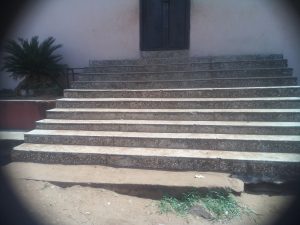
Ann finally got admission to study Mass Communication in one of the tertiary institutions in Anambra State in 2007; but then, came another obstacle.
“I tried to rent a hostel and preferred the school hostel, but the state of the hostel was nothing to write home about. They were not built for my type. All the hostels were multi-storey buildings and were not accessible.”
She had to go off campus in search of a private hostel.
“Where I found manageable, I had to pay 10 percent extra for the apartment to be given to me,” she said.
It was also a condition from the landlord to allow her carryout some reconstruction work for easy access.
Continuing, she said: “Attending lectures was hell as transporters regularly bypassed me. To save the situation, I resorted to chartering vehicle on a daily basis. I used a private taxi to school. Every time that I called a taxi to pick me, I paid between N1, 500 – N2, 000 per drop to school instead of the normal N150 paid by others for such a trip.
“At the auditorium where we normally had lectures, the steps were very high. For me to participate in the lectures, I always sat alone at the far exit door, while other students were inside the lecture hall. Most times, I struggled to even hear what the lecturers were teaching because of the distance.
“Some lectures were usually held either on the first or second floor of the school’s lecture buildings which I often missed.
“I bought concrete blocks and dropped them at the entrance of every building and office useful to me. Every day that I got to school, I carried two extra blocks from my house in case the older ones had been stolen.”
The pain and agony
Ann’s university experience was marred with near-death falls because the environment was unfriendly to her. A certain day made her think she had died.
“That day, I was using crutches and my back to climb. I was almost on the last step of the staircase, when suddenly, the quiz venue was changed and students, in their rush to the other venue, pushed me from the top of the staircase and I rolled uncontrollably to the last. I broke my arm and lost one of my teeth in that incident. That period, I spent four months in the hospital and missed lectures in the process.”
A similar scene saw her in her bid to climb another long staircase, one of her crutches slipped from the slippery floor and she fell off the pavement, landing awkwardly on her hip; her caliper pulled from the socket as a dangling iron from the walking aid pierced menacingly through her knee. “I bled uncontrollably and was hospitalised for nearly six months before I rejoined my mates.”
Ann’s journey in the school is what other persons with disabilities are passing through in their daily lives in different parts of the world. The United Nations said more than half a billion persons are disabled as a result of mental, physical or sensory impairment. It said no matter which part of the world persons with special needs are; their lives are often limited by physical or social barriers.
The same UN report noted that approximately 80 percent of the world’s disabled population live in developing countries. Similarly, the National Population Commission of Nigeria (NPC), in 2018 estimated that no fewer than 19 million Nigerians were living with disabilities. Thus, persons with disabilities represent a staggering 9.6 percent approximately of the country’s total population.
Persons with disabilities particularly those with physical disabilities belong to the group that face the most limitations in society. This is because they mostly have problems with balance, strength, or stamina. They find environments with conventionally constructed building entrances, which have difficult and unsafe stairs, difficult to be conveniently accessed by them.
For the persons with disabilities, such built environments are full of uncertainties, anxieties and dangers as they encounter many obstacles that prevent them from moving about freely and safely. The obstacles are mainly as a result of differences in height between indoor and outdoor levels at entrances or routes of public and residential buildings, community centres, schools, parks and places of worship.
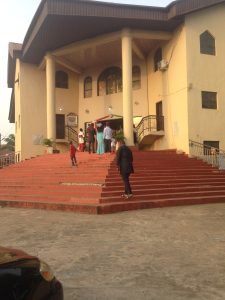
In addition, many disabled persons live in poverty. They need free access to social facilities like schools and hospitals to improve their livelihood, but most of these facilities are located in places where access is difficult for them. It was because of these that countries came together under the General Assembly of the United Nations and proclaimed the universal declaration of human rights which is also the UN Convention on the Rights of Persons with Disabilities (UNCRPD).
The Convention adopted on December 13, 2006 at the UN Headquarters in New York, aimed at making lives better for the disabled community worldwide.
Nigeria was among the first countries in Africa to sign the Disability Rights Act into law and a series of legislation took place at the national and sub-national levels for the promotion of the Rights of persons with disabilities.
Interestingly, Anambra State House of Assembly on September 13, 2018, passed the State’s Disability Rights Bills 2015 into law. The law was eventually signed by the Governor. Thus Anambra became the first state in the South-East to domesticate the law. The state went ahead to establish Disability Rights Commission, DRC, in 2021, to oversee issues of disabilities right violations in the state
With these developments, the hope of the PWDs in the state hit the high heavens with savory dreams and expectation of a change from the barriers, neglect and other discriminatory practices to enjoying a society where inclusivity, equality and accessibility reign supreme.
Unfortunately, these provisions appear to only exist on paper. It has been five years since the law was signed, yet the level of compliance is still significantly low to alleviate the sufferings of PWDs in Anambra. About 400,000 persons with disabilities in the state still suffer from discrimination due to lack of access to public buildings, essential services including healthcare, public transportation, employment, and other public facilities.
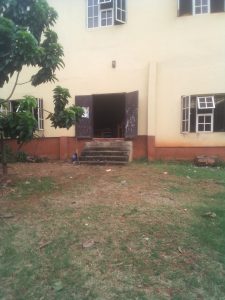
Accessibility still denied
Chairman, Joint National Association of Persons with Disabilities (JONAPWD) Anambra State Chapter, Comrade Ugochukwu Okeke, said “the implementation of the disability law has not been felt in the State particularly in the area of accessibility to public structures and government facilities.”
Section 23(1-8) of the Anambra State Disability Rights Law (2018) under Provision of facilities at public buildings gave a holistic directive on what must be done to guarantee accessibility to disabled communities in the state.
“A person with disability shall have the right and necessary facilities to access public buildings and public places,” subsection one read.
Section three also provides that “Government shall ensure that roads, side-works, pedestrian crossing and all other facilities made for public use shall be made accessible to and usable by persons living with disability including those on wheelchair.”
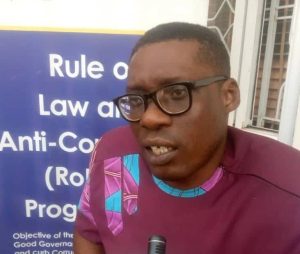
Okeke said “The implementation is not yet felt in the area of accessibility of government structures.
“Government facilities are yet to comply with the law that said all the public facilities should be accessible to Persons with Disabilities. We are yet to see changes. For instance, it is true that the State Secretariat has ramps, but they are only located outside. From the first floor to the last of all the buildings they all have long stairs that make life difficult for us.
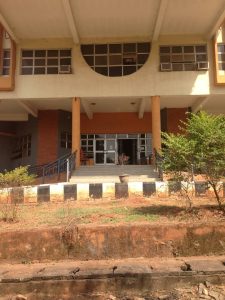
“Most Ministries like Justice, Education, and even Courts, among others that we are supposed to visit regularly, are upstairs with high foundations. They have no ramps or elevators that can easily take us from down to the office we desire to visit,” Okeke said.
Ifeanyi Igwegbe, the Vice Chairman, National Association of the Blind (NAB), corroborated Okeke’s submission that Anambra State had only attained 30 per cent in the provision of accessibility for persons with special needs.
According to him, “Ever since the law was enacted in the state, public structures with regards to the accessibility demands are merely 30 per cent in Awka capital territory alone. Communities distant from the capital city are nothing to write home about. The 30 per cent is even as a result of our advocacy.
“As far as the blind community is concerned, what we know as our own accessibility issues are recognition of white cane, making the road accessible for white cane users, people offering help and assistance, and role of drivers and traffic controllers towards white cane users.
“In more developed cities like Abuja or Lagos, you notice that whenever they are constructing roads, they usually create side-walks where pedestrians and our like can trek and go peacefully, but here in Anambra, there is nothing like that.
“It is unfortunate that most roads in the state do not have tracks and were built in such a way that does not favour the blind. Gutters in Anambra are not covered nor were sidewalks constructed. The only places where gutters are covered are Ukwu-oji axis of the Zik’s Avenue, and the Revenue-Immigration road. The newly built Roban Stores road in Awka has sidewalks but the gutter is deep, scary and very dangerous.
“For instance, if the gutters are covered or sidewalks created, you notice that a blind can go on the road with his white cane without falling inside the gutter or dragging roads with vehicles,” Igwegbe said.
Barr Peter Moneke, the JONAPWD Anambra Legal Adviser, summarised the situation when he said: “So many facilities are still no-go areas for persons with disabilities in Anambra State. Majority of churches, hospitals, courts, schools, and even hotels in the state are yet to comply with the provisions of the law; consequently, PWDs in the state are excluded from governance, healthcare, social and community life.”
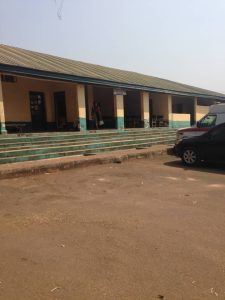
Moneke, further told Ikengaonline: “As I am talking to you now, nothing has been done to make the public facilities accessible for PWDs, except the few ones that came courtesy of our advocacy visits. The facilities, both public and private, in the state have not complied with the provisions of the law.
“We have the right to access the court, but we are also surprised that PWDs cannot access many of them. For somebody walking with the aid of crutches to climb the staircase of Nnewi High Court is difficult, not to talk of the person on a wheelchair.
“Today, if a person with a disability wants to access the Nnewi North Local Government secretariat, it is not possible. The first floor has a hall, but one of us that works there cannot access that hall. She cannot even go to the chairman’s office, except some people carry her up to the first floor where the office is located.”
Moneke said that the law had provided almost everything that would make the lives of the disabled community better, but regretted that the provisions had not been adhered to. He also said that improving the accessibility of the built environment for the disabled people was critical to their being able to live independent lives.
Corroborating, this, Ikechukwu Ezeokafor, who is with physical disability said about 80 per cent of the public facilities in Nnewi North, even in his native Orumba North Council Area “are not accessible.”
According to him, “Public institutions like Town Union Halls, maternities, hotels are not accessible.
“The government has failed us on this issue. They have failed to address the accessibility problem of the disabled group, and it is not as if they do not travel out and see the way it is done. That they are failing to do it for us is not a matter of money, but will.”
He continued: “What we want is inclusiveness, nothing more. I don’t want anybody to put a ramp or door at the back of his house because of me. The ramp or door should be at the front so that everybody can use the same front because what determines my disability is my inability to come in like others.”
When Ikengaonline visited Nnewi North Local Government Area to verify this information, we found the claims to be true. The Council secretariat has high buildings with floors and stairs designed with tiles. The magistrate court which is domiciled in the secretariat has high stairs too with no ramp, making it cumbersome and tricky particularly for persons with physical disability.
Facilities in other Council areas including Orumba South, Dunukofia, Orumba North, Njikoka and Orumba North council areas were observed to be lacking disability features. Facilities in these council areas including offices, medical centres, are still with no ramps hence denying PWDs their legal rights to access the structures.
“We cannot talk of accessibility of any building in our council headquarters,” Chisorokwuo Madu, Chairman of JONAPWD Orumba South, and Innocent Okafor, Dunukofia Coordinator, told Ikengaonline respectively.
They said “Government facilities are not accessible to the disabled persons at all in our area.
“The buildings have high stairs and are all very hard for some of our members that are using wheelchairs and crutches. As it stands, they cannot go up to see the local government chairman or do anything administrative without being helped by somebody.”
Ikengaonline visited the State Government House and discovered that 90 per cent of the administrative structures and offices are not accessible. The office of the Deputy Governor, the medical centre, Secretary to the State Government (SSG) office, Conference centre where the traditional rulers hold their monthly meetings and the state ICT office among many others are still not accessible to persons with disabilities despite the law being signed by the government.
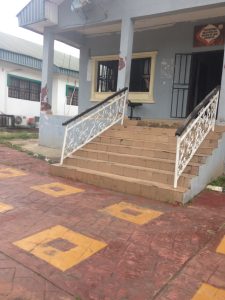
Elsewhere, premises of Dora Akunyili Women Development Centre housing the Ministry of Women and Children Affairs are not accessible to the blind and those in wheelchairs. In existence there are uncovered gutters that pose danger to the blind community who regularly visit the area for their periodic meetings and other annual events.
Their failures, our pain
PWDs said they have had disappointing and near-death experiences because of the failures of institutions to provide accessibility on some of the facilities in the state. Chairman National Association of the Blind (NAB) Anambra State chapter, Ernest Okamelu, reported that majority of NAB members in the state have found themselves inside gutters; either knocked by passing/reversing vehicles or in their bid to dodge vehicles passing by.
Okamelu said, “Just last two weeks, one of the NAB Anambra Executives fell inside the gutter in Onitsha on her way to our meeting. She sustained serious injuries and was hospitalised.”
According to him, what the law says is not being carried out in the state.
“The law provides that the Government shall ensure that roads, sidewalks, pedestrian crossing and all other facilities made for public use are accessible to and usable by persons with disability including those in wheelchairs.”
Narrating the ordeals of PWDs, Ezeokafor said: “I was at the Government house last week to submit a letter for World Disabilities Day celebration. We wanted to submit a letter as well as see the Commissioner for Local Government Affairs, but we were not able to access the building. It was one of us with one leg that, amidst difficulty, entered and submitted our letter.
“In Nnewi, I can count the number of churches that are accessible. Even the cathedral where the Catholic Bishop worships is not accessible. I had a personal encounter with a church that refused to put ramps at the entrance. Church is supposed to be the place where people with problems go for solace, but they are not interested in our plights. If they put us in mind, most of the church auditoriums would be accessible.
“Recently, the battery of the equipment I use to do my check-up at home was low. I drove to a health centre in my locality but could not access the facility. I stood outside and called the lady working there for assistance but unfortunately the two ladies there could not even lift one of my two legs.”
Another physically challenged who gave her name simply as ‘Mary’ disclosed that she nearly lost her hearing ability as a result of self-medication.
“Most times, self medication is our saviour during critical conditions. In fact, the last time that I was sick was due to self medication and I nearly lost my hearing ability because of that,” she lamented.
Mary further disclosed that many PWDs are victims of self medication because they lack access to health facilities close to them. She reported that most of the laboratory offices, especially the privately owned, are located upstairs making it frustrating for crutches and wheelchair users to use their services especially at critical times.
A visually impaired civil servant, Ifeanyi Igwegbe said he has fallen inside the gutter on countless occasions and sustained different degrees of injuries in each of the falls. He recalled that avoiding vehicles has been the blinds’ biggest challenge but noted that some of those falls could have been avoided if the road had sidewalks and other accessible features.
“One day, I was going to see a friend in Ifite Awka and was standing by the roadside waiting to board a tricycle, but suddenly I was brushed into the gutter by a reversing vehicle which gave me serious bodily injury. The other day, a vehicle broke my white cane without any clear remorse. In Onitsha, drivers even hit us, break our white cane and drive away without giving us attention,” he said.
Ramps fixed, but death traps
Ikengaonline investigation discovered that some existing ramps for public buildings are not well designed and have steep inclinations, slippery surfaces, with inadequate railings, inappropriate locations and are often too long with no landings. In many instances, PWDs find the use of such poorly-designed ramps inconvenient or difficult, and prefer to use the stairs despite the challenges that come with it.
Ezeokafor who spoke to Ikengaonline said: “Over 90 per cent of the ramps attached to structures are death traps.”
According to him, “Some ramps were constructed with tiles making it both slippery and dangerous for some of us using wheelchairs and crutches.”
“Ramps with tiles are more dangerous to us than not building them at all. This is because any little water on it can send us to the hospital. The tip of our crutches is rubber and if placed on anything like shiny ceramic tiles, it will carry you away.
“Some of the ones they constructed in hotels are coated with chemicals such that any attempt to step on it, the person goes down. It should be a bit rough to fit the crutches,” Ezeokafor said.
The United Nations recommends that ramp surfaces should be hard and non-slip, but investigation by Ikengaonline discovered that 60 per cent of the ramps in Anambra have ceramic floor tiles finish while others have unpolished terrazzo finish and cement sand screed finish.
Sharing her experience, a wheelchair user, Chidimma Ajemba, said regular falls on tiles has become part of her life.
“Whenever I go out, my mother keeps praying for me so that there will be clear weather. This is because she knows that if it rains I will definitely fall and sustain injuries.
“Most of us have fallen countless times as a result of heavy slip-offs while moving with crutches on ceramic tiles. Sometimes such slip-offs result in severe injury that would require months in the hospital,” Chidimma said.
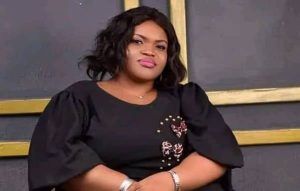
When contacted, a civil engineer, Chibuike Ughelu said polished tiles do not provide non-slip for those using crutches and wheelchairs, hence, they pose a significant hazard of slipping off especially in times of rain.
According to him, “Most of the ramps are neither covered or protected. Another problem is the limitation of space and constraints at the starting and ending points of projects. It is largely because the provisions of ramps are treated as afterthoughts.
“Some ramps could not be used because of inappropriate gradients. Some of the gradients are high, making it inconvenient and difficult to negotiate.”
Dwindling employment fortune
From records, Anambra is rated the most-friendly state particularly on disability matters especially during the tenure of Ex-Gov. Willie Obiano. The state was not only the first to enact the disability law in 2018 but many PWDs were appointed and recruited into the state civil service. In 2019 alone, over 200 PWDs were recruited, while some were believed to have benefited from the engagement of 5,000 teachers by the Soludo-led administration.
However, Okamelu, the NAB State Chairman insists that persons with disabilities in Anambra State live in extreme poverty.
“Vast number of PWDs in Anambra State currently have no work nor are empowered with skills to engage in productive ventures. Most of us depend on our loved ones for survival,” said Okamelu.
Continuing, he said “We have graduates but our members are not employed.The number of PWDs employed in this current administration is not up to 1%. It is very poor. Many of us are patrolling, jumping up and down looking for what to do in the state when we can fit-in in some of the government and non-government establishments.
“Those in authority are not helping matters. The handling of the government recruitment is very harsh coupled with the economic situation of the country. The previous administration recognised persons with special needs very well and there was a sense of belonging particularly in aspects of appointments and employment. This is important; the government is supposed to have considerations for persons with disabilities in areas we are deemed capable of earning sustenance and contribute to the growth of the state.
However, Okeke, the JONAPWD Anambra State chairman posits that the employment of PWDs is never on compensatory basis, but on merit.
For Okeke, “The law states that in any recruitment by the government, one percent should be reserved for us. That means if the government is employing 3,000 workers, 30 slots should be allocated to the persons with disabilities.”
Okeke’s argument is in line with the provisions of Section 49(6) of the Anambra State disability law which states that “All employers of labour employing up to 100 persons shall reserve at least 1 percent of such workforce for qualified persons living with disabilities.”
According to Okeke, “The disability law made the provisions but the last teachers recruitment exercise had no reflection of it.”
He said, “The only thing I want is to give us equal opportunity to participate. We regretted that from the design of the portal for individual registration, no space was given for such a statement to indicate if applicants have disability or not, as well as specifications on the type of disability.
“Before the recruitment exercise, we wrote severally to Anambra State Post Primary Schools Service Commission (PPSSC) and the State Universal Basic Education Board (ASUBEB) in charge of the examinations on the need for specification inclusion and to monitor accessibility features of the examination facilities, but nobody responded to the letter.”
He said the problem had made some JONAPWD members not to be successful in the last recruitment of 5,000 teachers, their sole hope of being employed to earn a living.
Apparently touched by the complaints of challenges experienced by persons with disabilities during recruitment examinations in the state, wife of the State Governor, Mrs Nonye Soludo, in October, 2023, announced that the Government would set up designated examination and interview centres for persons living with disabilities who were undertaking recruitment into the state’s civil service.
She recounted the story of a visually impaired man who experienced hard time meeting up with the recruitment pressure during the last teachers’ enrollment largely because there were no special provisions for people with disability. She pledged to eradicate such difficulties by ensuring inclusive measures in future recruitment drives.
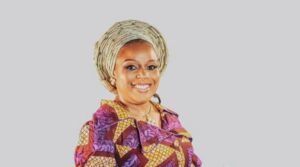
Fresh recruitment, no sign
Anambra State Government, in November 25, commenced the conduct of Computer-Based Tests for applicants for the 2023 teachers’ recruitment exercise. 3000 teachers were targeted, for Post Primary School Service Commission, PPSSC and the State Universal Basic Education Board, ASUBEB.
The recruitment was driven by the Commission and the Board, with technical support from the State ICT Agency.
Okeke, who was not willing to take chances with his members, said he wrote to the Commission and the Board to remind them of the need for the special centres, but disappointingly was told that there was no such provision as at that time.
“This time, my Vice, Ifeanyi Igwegbe, took the letter to ASUBEB and PPSSC, but we were told that the letter arrived late and would disrupt their timetable. Such lapses and omissions, he said, had a lasting impact on the performance and outcome of the employment exercise for PWDs.
When contacted, Ifeanyi who dispatched the letter said authorities at PPSSC only reassured that a special centre would be created for the same exercise for PWDs, but noted that their counterpart at ASUBEB showed no concern about their plea.
“We made a request for a special centre and consideration of our members in terms of more time for the blind to answer their questions. You don’t expect a blind person to measure up with a Computer-Based Test (CBT) because the system does not talk. Though the person might come with a helper, he would need to listen to the questions that are being read, repeat, think, and then answer. So, you don’t expect them to be as fast as the person that is whole,” Ifeanyi said.
Continuing, he said “At the end, PPSSC okayed our request with a promise for a special exam centre, whereas authorities at ASUBEB did not give us a positive response.”
Efforts made to reach the ASUBEB chairman was futile, but her administrative Assistant who failed to disclose her name said the recruitment exams were over and that JONAPWD failed to address any official letter to the Board on that regard.
“The recruitment exams have ended. But I told them (JONAPWD) to bring a letter to ASUBEB so that their exams would be fixed but they didn’t do anything like that.”
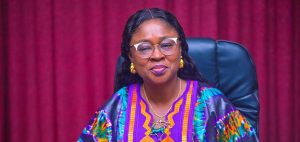
The budget saga
In August, 2023, Former Nigerian High Commissioner to South Africa, Uche Ajuluchukwu, claimed that PWDs in Anambra are starved of funding and that the state government particularly the Soludo administration has failed to accommodate persons with disabilities and the vulnerable community in the state’s budgetary allocations.
According to her, the Governor “has never budgeted a dime for, nor released one Kobo to Persons with Disabilities (PWDs) in the State since he came on board in 2022″ despite their contributions to engender good governance and development of the State.
Responding, the Chief Press Secretary to the Governor, Christian Aburime, dismissed such claims as “untrue and spoken out of ignorance.”
Corroborating the government’s stand on the claims, JONAPWD Anambra State Chairman, Ugochukwu Okeke, stated that the needs of the disability community were well captured particularly in the state’s 2023 budget as against the claim that no provision was made at all.
Clarifying the matter, Okeke said, “For the 2023 budget, I am emphatically speaking through this medium to clarify that there are many budget line items provided in the Ministry of Women’s Affairs and Social Development budget estimate to take care of the needs of Persons with Disabilities including some of the needs of the Disability Rights Commission.
“Having gone through the 2023 Anambra State Budget Estimates pages 269 to 271, I want to confirm that our needs are well captured in the budget.”
Okeke identified some of the budget line items with the Ministry of Women Affairs code to include: Support to JONAPWD for Capacity building, Establishment of Disability Commission, Purchase of Disability Equipment, Sensitisation Programme for MDAs, Traditional leaders, and Religious leaders, for Commission, and Disability Commission Compliance and enforcement.
Others he said were: Monitoring & evaluation and research development, Social intervention and Empowerment for disabled couple, Child and Family Support Programme, Disable sports competition, and International Day for Persons with Disabilities.
Okeke recalled that Soludo’s administration, in 2022, had given subvention to Persons with Disability Organisations in the state through the Commissioner for Women Affairs and Social Developments.
Needs captured, yet no fund
Okeke noted that the challenge the disability community is facing as regards most of the budget provisions is the inadequate release of funds.
He said: “Most times we get our funding from our development partners. If you want me to mention them, the bulk of the money we have used so far to carry out our programmes is from development partners. Then, very little comes from the state government.
“JONAPWD are entitled to subventions from the state government from 2021. It is even usually included in the annual budget but we have not been able to access it. The budget is under the Ministry of Women Affairs. We have tried sometimes to access it but the information we got was ‘there is no money.’ That was when the present administration came in.
“Since then, we have written several entries to use it to empower our members as well as buy assistive devices during our International Days, but we couldn’t get any.
“Early 2022, the ministry visited all the clusters of JONAPWD where they were having meetings and gave them money. They equally gave JONAPWD a token to support what we were doing. But looking at the quantum of work we do, the money was not enough.”
Corroborating, Spokesperson of JONAPWD, Chidimma Ajemba, said “Since then, nothing has been given to the disability community in the State.”
“The money is what we are supposed to be using to organise skill acquisition, other training programmes and even to help some of our members in serious need,” she added.
Speaking further, Ajemba said “The Department of Welfare of every Local Government has roles they are supposed to be playing for persons with disabilities but according to her, those roles are abandoned.
“JONAPWD at the local government level is entitled to receive subvention because we are a nongovernmental organisation registered and certified under the local government. Again our PWDs at the local government are entitled to supports but nothing is being given at all.
“It is the job of the Welfare Department to provide succor to PWDs and even buses to attend their annual International days which has been the practice for years, but we are now denied of these.”
Ray of hope
Every budget with a sense of disability has been estimated under the Ministry of Women’s Affairs. The Anambra Disabilities Rights Commission which was formed in February 2022 has existed for nearly 2 years without a budget code, limiting their impacts towards ensuring the elimination of barriers and other matters of PWDs in the state.
Section 3 of the DRL 2018 required that the Commission be a statutory body with perpetual existence on its own. It is also empowered to have its budget and implement the provisions of the law.
However, the Anambra State Government in its 2024 budget granted the Commission a budget code signaling its independence as required by the status that formed it. With the approval of the 2024 budget, it is expected that there will be significant changes in issues concerning persons with disabilities in the state.
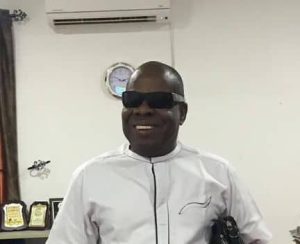
Speaking with Ikengaonline, Chairman of Anambra Disability Rights Commission, Barr Chuks Ezewuzie, said “the budget when approved will bring a solution to the problems of the Commission whereby the Commission can now implement the guidelines of the government, the provisions of the law and make persons with disabilities in Anambra State feel included.”
Ezewuzie said “the commission plans to take steps to enforce the accessibility requirements of the Disability Rights Law on public and private structural facilities, parking lots, building plans, and permits.
“The commission will vigorously pursue processes to harness the revenue windows provided for in the Disability Rights Law to support the government and persons with disabilities. The commission will embark on fact-finding tours to special schools and rehabilitation centers in the State to ascertain the truth about the often reported sorry state of affairs in these centers,” he added.
Noting that the commission is a one-stop shop for all disability issues, Ezewuzie said “DRC has come to galvanise all those government actions ideas, and programmes to form policies that will advance the status of persons with disabilities.”
“The commission is planning on-the-hill investment summit which will give us avenue to highlight the areas persons with disabilities are contributing to the growth of GDP of Anambra State.
“We expect that persons with disabilities would be included in every aspect of the social, educational, and economic life of our state. That vision to build a prosperous livable homeland cannot be realised without disability inclusion. In other words, the social agenda of Mr Governor under which disability inclusion falls is achievable.”
This Report is part of activities by the Ikenga Media & Cultural Awareness Initiative (IMCAI) under the Collaborative Media Engagement for Development Inclusivity and Accountability Project, a multi-level intervention for media independence and government accountability, managed by the Wole Soyinka Centre for Investigative Journalism (WSCIJ) and supported by MacArthur Foundation.



